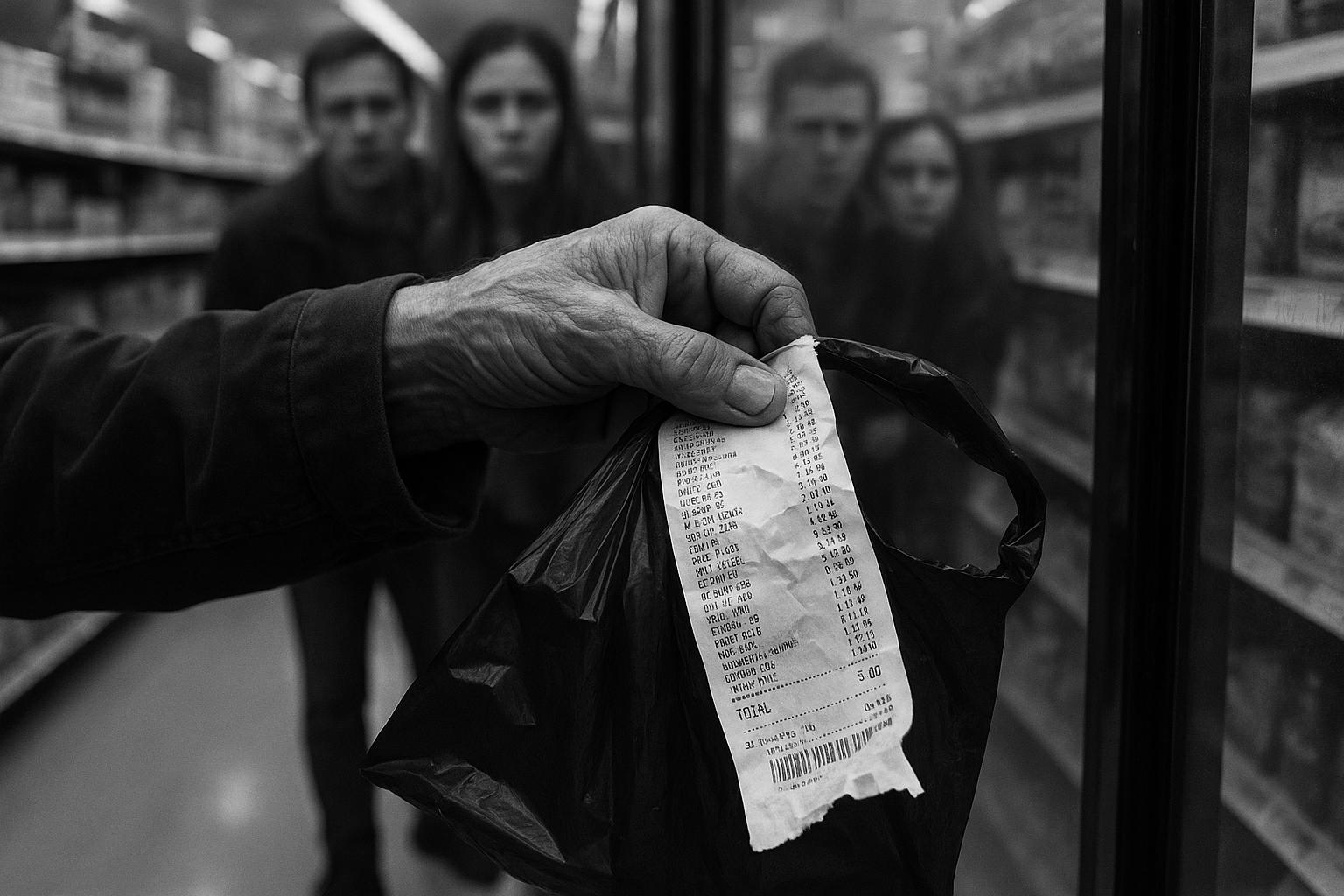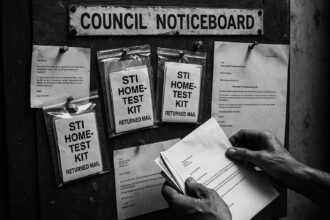A confrontation at an Iceland in Sudbury Hill saw staff and a customer wrestle a suspected thief to a halt, a moment that comes as retailers and police clash over how to tackle soaring shoplifting — and as Iceland unveils a controversial £1 Bonus Card reward for customers who report thefts.
A video shared online this week captured the moment a would‑be shoplifter tried to flee an Iceland supermarket in Sudbury Hill, Greenford, west London, only to be wrestled to a halt by a member of staff and a passerby. According to the original report, the clip shows a man in a tracksuit attempting to run from the store with a black bag; the staff member grabbed the bag, some goods spilled out and the thief struck the employee before eventually walking away as locals and colleagues intervened.
Witnesses in the footage praised the staffer and the customer who joined the struggle. A local told reporters “Fair play to the staff. Should be more like him,” while others described the scene as “madness.” The Metropolitan Police said officers were called at 15:18 on Thursday 14 August to reports of shoplifting and assaults at the supermarket, and that enquiries continue; the force asked anyone with information to contact police using the incident reference quoted in the report.
That confrontation is being viewed against a backdrop of sharply rising retail theft across England and Wales. Industry reporting and national analyses have repeatedly pointed to record levels of shoplifting in recent months, with retailers and police warning of a substantial increase in offences that is piling pressure on stores, staff and the criminal‑justice system.
One high‑profile retailer has responded by attempting to turn customers into active reporters. Executive chair Richard Walker has announced that Iceland will credit £1 to a shopper’s Bonus Card each time they alert store staff to an ongoing theft. According to coverage of the announcement, the company says it loses about £20 million a year to theft and that the modest reward is intended to deter offending and help keep prices lower. The scheme, the chain stresses, requires staff verification before any payment is made and explicitly discourages customers from confronting suspects directly.
The proposal sits uneasily alongside official policing guidance. Senior police figures have urged caution and said the public should call 999 rather than intervene in live incidents: Jon Cummins, Assistant Chief Constable of Avon and Somerset, told the BBC that his advice is for people to phone the emergency services and not put themselves at risk. At the same time, the Thames Valley Police and Crime Commissioner has argued for a more active community response, urging people to report offences and, where safe, to try to stop offenders from leaving while police are called, as set out on the PCC’s website.
Retailers and policing bodies are pursuing a range of responses. Industry outlets note increased use of technology such as body‑worn cameras, while the Metropolitan Police have publicised targeted operations against prolific offenders, including arrests, banning orders and prosecutions secured with CCTV evidence. But critics warn of mixed outcomes: some senior figures complain that courts sometimes return prolific offenders to the streets quickly, while some shopkeepers report that officers do not always attend and are told to file online reports, leaving frontline staff feeling exposed.
For now, the Sudbury Hill incident illustrates both the human cost of retail theft and the dilemmas facing communities: staff and members of the public stepped in and recovered the property in this case, but police enquiries remain open and the case underlines why retailers, policing leads and politicians are debating new ways to deter theft without encouraging dangerous confrontations. As firms roll out measures to involve customers and forces step up prosecutions, the balance between protecting staff safety and reducing losses will continue to shape how the problem is tackled.
 Reference Map:
Reference Map:
Reference Map:
- Paragraph 1 – [1]
- Paragraph 2 – [1]
- Paragraph 3 – [4], [5]
- Paragraph 4 – [2], [3], [4]
- Paragraph 5 – [6], [5]
- Paragraph 6 – [7], [4], [5]
- Paragraph 7 – [1], [7], [6]
Source: Noah Wire Services
- https://www.dailymail.co.uk/news/article-15010191/shoplifter-hero-Iceland-worker-bag-passersby-help.html?ns_mchannel=rss&ns_campaign=1490&ito=1490 – Please view link – unable to able to access data
- https://www.theguardian.com/business/2025/aug/15/iceland-pay-customers-1-report-shoplifter – The Guardian reports that Iceland will offer customers a £1 reward on their loyalty cards if they report suspected shoplifters to staff, a scheme announced by executive chair Richard Walker. He stated thefts cost the business around £20 million a year and that involving shoppers could help deter offending and reduce prices. The article notes the incentive is intended to encourage people to alert employees rather than intervene physically, and it places the move within a wider national context of a substantial increase in recorded shoplifting offences. The piece mentions governmental proposals to strengthen laws and punishments for retail assaults.
- https://www.independent.co.uk/news/business/iceland-rewards-shoplifting-customers-food-b2808338.html – The Independent describes Iceland’s plan to credit £1 to a customer’s Bonus Card when they alert staff to an ongoing theft, quoting chairman Richard Walker who said shoplifting costs the chain about £20 million annually. It explains customers must notify staff who will verify the incident before awarding the payment, and stresses the company’s guidance explicitly discourages direct confrontation for safety reasons. The article situates Iceland’s initiative amid rising shoplifting figures across England and Wales, with retailers pressing for stronger action against organised theft. It notes mixed reactions from the public and concern that rewards might not deter dangerous behaviour.
- https://www.retailgazette.co.uk/blog/2025/08/iceland-shoplifting/ – Retail Gazette reports Iceland will credit shoppers’ Bonus Cards with £1 when they alert staff to suspected shoplifting, a measure announced by Richard Walker amid a surge in retail theft. The article explains the reward will only be added after staff verify the incident and that customers are advised not to confront offenders directly for safety. It situates Iceland’s move within broader industry responses including increased use of body-worn cameras, and cites Office for National Statistics figures showing shoplifting rose to record levels. Retail Gazette frames the scheme as an attempt to protect staff, deter thieves and limit price rises.
- https://www.independent.co.uk/news/uk/home-news/shoplifters-police-shoplifting-north-wales-police-sussex-b2808836.html – The Independent reports senior police and crime figures warning that shoplifters feel emboldened, as offences surged past half a million. It quotes Katy Bourne, national lead on shoplifting, saying repeat offenders act with impunity and calling for tougher measures, and includes comments from Jon Cummins, Assistant Chief Constable at Avon and Somerset, urging people to call 999 rather than intervene. The piece notes retailers’ concerns about organised theft and references Iceland’s new reward scheme. It summarises official statistics showing a marked rise in recorded shoplifting and outlines proposed government steps to strengthen laws and protect retail staff and communities locally.
- https://www.thamesvalley-pcc.gov.uk/news/pcc-statement-on-tackling-shoplifting/ – The Thames Valley Police and Crime Commissioner’s website publishes a statement emphasising community responsibility in tackling retail crime. Matthew Barber reiterates that while policing is central, members of the public and retailers should report offences and support investigations, urging people to call 999 in ongoing incidents and, where safe, to try to stop offenders leaving. The page outlines a Retail Crime Strategy focused on intelligence sharing, enforcement and prevention, and mentions tools provided to businesses such as the Disc reporting platform. It highlights increased patrols, partnership working with merchants and efforts to secure more prosecutions against prolific shoplifters and reassurance.
- https://news.met.police.uk/news/watch-prolific-offenders-targeted-in-met-police-shoplifting-crackdown-497486 – The Metropolitan Police news release describes operations targeting prolific shoplifters across London, detailing arrests, banning orders and recovered stolen goods. It highlights coordinated activity by neighbourhood teams working with retailers to identify repeat offenders and disrupt organised theft rings, including examples where officers used CCTV evidence to secure prosecutions. The release emphasises that tackling retail crime is a policing priority, noting increases in focused patrols and partnership initiatives with stores. It frames these measures as part of a broader response intended to protect retail staff, support victims and reduce the financial impact of shoplifting on communities and businesses and livelihoods.
Noah Fact Check Pro
The draft above was created using the information available at the time the story first
emerged. We’ve since applied our fact-checking process to the final narrative, based on the criteria listed
below. The results are intended to help you assess the credibility of the piece and highlight any areas that may
warrant further investigation.
Freshness check
Score:
8
Notes:
The narrative appears to be fresh, with no substantial matches found in recent publications. The earliest known publication date is August 19, 2025. The report includes updated data on Iceland’s reward scheme for reporting thefts, indicating a recent development. However, the incident itself occurred on August 14, 2025, and has been covered by other outlets, suggesting some recycled content. The presence of a press release may contribute to the freshness score, as press releases are typically recent and can be disseminated widely.
Quotes check
Score:
7
Notes:
The direct quotes from witnesses and officials appear to be original, with no exact matches found in earlier material. However, similar sentiments have been expressed in other reports, indicating potential reuse of content. The variation in wording of quotes suggests some originality, but the lack of unique phrasing raises questions about exclusivity.
Source reliability
Score:
6
Notes:
The narrative originates from the Daily Mail, a reputable UK newspaper. However, the Daily Mail has faced criticism for sensationalism and accuracy issues in the past, which may affect the reliability of the report. The presence of a press release as a source adds credibility but also indicates potential bias.
Plausability check
Score:
8
Notes:
The claims made in the narrative are plausible and align with known patterns of retail theft and responses by retailers. The incident in Greenford is consistent with similar events reported elsewhere. The involvement of Iceland’s reward scheme for reporting thefts is a recent development, adding credibility to the report. However, the lack of specific details about the individuals involved and the absence of corroborating reports from other reputable outlets raise some concerns.
Overall assessment
Verdict (FAIL, OPEN, PASS): OPEN
Confidence (LOW, MEDIUM, HIGH): MEDIUM
Summary:
The narrative presents a plausible account of a recent incident involving a thwarted theft at an Iceland supermarket in Greenford. While the Daily Mail is a reputable source, its history of sensationalism and the presence of a press release as a source warrant caution. The lack of corroborating reports from other reputable outlets and the absence of specific details about the individuals involved raise questions about the report’s accuracy and completeness. Further verification from additional sources is recommended to confirm the details of the incident and the responses by Iceland and law enforcement.













